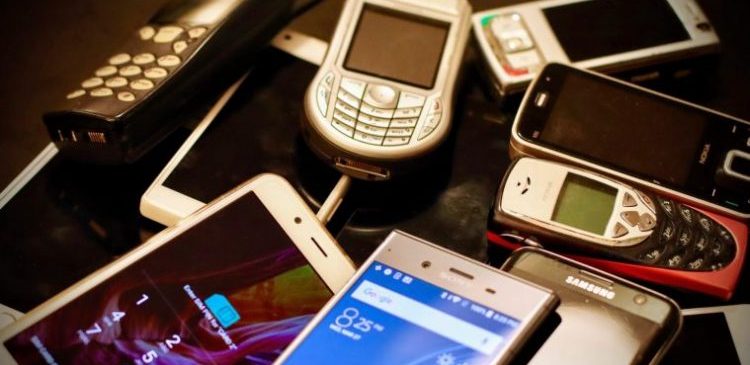We all know the pleasure of buying something brand new, the aura of freshness that comes when you first open the package. For me, this comes with an air of excitement as the packaging falls away, and the new item is first taken out still in its protective wrapping. That distinctive smell of ‘new’ in the air comes with the item’s promise radiating forth. Very often, as you open the package up, there’s a smell that comes with it, a real scent, not just a metaphorical one; it’s the smell of newness. When it comes to cars, they’ve tried to bottle that new car smell, which we all seem to know, though I think we might be collectively horrified if we knew what chemicals that produce it. All of this excitement, we feel for something new.
Most of the time, we’re replacing something; BUT what happens to the old one?
We’ve all become increasingly accustomed to that newness. There are new models of almost everything each year with the latest changes and updates. In some cases, the device from the past still works perfectly well, but because it isn’t new, its relegated to the trash bin or, like my old iPhones, an office drawer. I don’t replace my phone often, I’m still on an iPhone 7 (as unbelievable as it is, it’s perfectly fine).
Most people today have a cell phone, and most people have also replaced their cell phones with the latest and greatest model. Think back to the last time you did that, what did you do with that old phone when the shiny new one arrived?
And it went into the trash
It’s either in a drawer somewhere, like mine, or it got thrown out. Let’s face it the moment the new phone came in the old one was essentially garbage. Even if you still have it, the chances that you use it are minuscule. I have not one, but three phones in one of the drawers in my office. The best part of this, we actually cycle through our phones – my daughter just got one of my old phones that was upgraded. She’s happy as a clam because she has a phone (I lost the battle – this is her first phone, but at least it wasn’t brand-new)
Using cell phones as our case study shows just how pervasive our throwaway society is. Cell phone companies design the devices to be durable enough that they won’t break right away, but they also design them so new models come out each year. Sounds similar to the car industry, a little fresher and a bit better. Even if some models are even pretty big jumps in features and tech, most aren’t. Everyone wants the new phone – ok maybe not everyone but the idea is there; the new phone has new things. Kind of like the car industry, there is some allure to the person that has the latest gadget.
Perspective is often everything, and the example of the cell phone definitely comes with some interesting realities. I checked a couple of the local cell phone carriers for the prices of their phones (I used iPhones for my own familiarity), and I was a little shocked. The iPhone 11 came in at a whopping $1,005 CAD, but if you didn’t have that money right away, it could be brought right into your monthly plan at a much more reasonable $33/month.
The monthly plan is meant to entice you into getting the device without the huge price tag, which it succeeds at very well. These phones often replace an older version (like my iPhone 7). Naturally, I wanted to see if these were being sold and lo and behold, they were for a comparatively cheap $430 CAD.
The sheer audacity of the fact that a “new phone” replaces a perfectly functional one that is still sold new at over $400 boggles the mind! The crazy part is that the old phone, which likely still works, becomes garbage too often. I even checked some online classifieds, and that same phone used sells for as much as $300! But we’ve decided that replacing and throwing the device out is viable.
It just paints a bleak picture where we are lured in with the latest and greatest. We simply throw out good products.
I’ve been using the lowly cell phone as my example, but it isn’t an outlier but more typical than you would expect. Many more things exemplify this though maybe aren’t replaced as often, but are throwaway when they are. Think about your flat-screen TV, the cost has become so low that if we need to replace them, we just throw the old ones out, working or not. Before you can even question this, I have a story about just this. For me, this was really exemplified a few years back when we had a flat-screen TV that I knocked over; I wasn’t paying attention, and it fell, and while the crash didn’t seem like it would be that catastrophic (I partially caught the tv). Needless to say, the screen was broken. I was naïve and thought it wouldn’t be a big deal, all you had to do was swap the screen.
Cost of Repairs – TOO High
Yes, boys and girls, I wanted to repair the TV, thinking it would be simple to swap out the screen!
I called up one shop that does electronic repairs (yes, they STILL exist), and the guy flat out told me it would be more expensive to replace the screen than it would be to buy a new tv. It was cheaper to throw the TV out and get a new one than to fix it. Besides my encounter with gravity, the TV worked perfectly well, but I was being told it was garbage.
This is starting to creep further and further into our lives. We recently had our relatively new appliances start breaking, and the cost of the repairs was comparable to simply replacing the machines. I managed to repair a few of them, but if I wasn’t willing to do so, the same repairs would have been as expensive as a new item.
It’s pervasive, from appliances to electronics to food packaging, it seems that most of the items are simply meant to be thrown out. The sheer quantity of unrecyclable packaging that our food comes in just boggles the mind. We are conditioned to throw out so much that when it comes time to get something new, the old one is naturally garbage even if it’s still perfectly serviceable. We’re taught this at such a young age I’m not surprised our society as a whole has become a throwaway society often at the cost of our environment.
Our North American society has become obsessed with the latest and greatest that we are willing to continually replace items, and the manufacturers have learned. Why build with quality if the idiots will pay to replace the item over and over. Hire a couple of good statisticians and mathematicians, and they will tell the company just how long they need to make the device last.
We now live in a throwaway society. Maybe I’m bucking the trend because I managed to fix a couple of things, but that is more effort than most people are willing to invest. How much waste does this produce? The money, the materials that aren’t recycled, and the aggravation. It’s frustrating to think that we’re ruining this world for replacement items (don’t get me started about single-use plastics). All I know is that if we’re not careful we’ll be in the magical world of Disney’s Wall-E before we know it, we’re definitely well.
Photo by Eirik Solheim on Unsplash




Not only is it super concerning that we actively participate in throwing out stuff… Our minds have basically been trained to believe that we NEED the latest whatever it is. I am still using the iPhone 6 and it works fine. It calls, emails, texts, and does all the other things a modern cellphone should. Like you said, “We are conditioned to throw out so much that when it comes time to get something new, the old one is naturally garbage even if it’s still perfectly serviceable.”
Thanks for the comment Kat. You’re right we’ve become conditioned that throwing things out is natural and right. I’ve been reading Walden and the recycling and repurposing of items was much more common 100, 150 years ago. It’s a shame, our world likely doesn’t need to be as polluted as it is.
I too still have an iPhone 6, and only purchased that one when My iPhone 4 was forced into obsolescence by Apple and the app companies that refused to keep updating some apps I use for work. Super irritating. This yet Apple is/has stopped updated the iPhone 6 so I know it’s just a matter of time. I sometimes contemplate not having a smartphone when I retire but it may be difficult. Too much of society assumes everyone has a shiny new smartphone and is organizing life such that it might be a necessity. I.e scan this URL and answer the covid survey before you go into work; sign up in our app to book your appointment to get blood taken at the local lab etc.
For me the answer to our throwaway culture has been minimalism. The less stuff I have/buy – the less I will need to replace/throwaway/maintain. Just working on getting my family to adopt my mindset too…..
Thanks for the comment Anna. There was a segment of society that was pushing towards dumbphones, and surprisingly many of them were high ranking executives trying to get some of their time back. But you are correct with our world in its current state of chaos; it may be difficult.
Great post Matt. Just discovered your blog and happy to have found another Canadian blog out there. It’s all so sad but true. As you noted, the examples can go on and on. We just bought a house from the 70s as our new 2016 townhouse is clearly not built like they used to be and we’ve encountered so many little headaches with it the past 4 years. And of course, electronics too. Toaster ovens, coffee pots, baby monitors, etc. It’s truly astonishing how hard it is to find DURABLE goods these days!
Thanks for the comment Court, I’m glad you found the site and now I’ve also found yours. The worst part about how quickly we replace perfectly functional things (an iPhone is pretty durable) but can’t make the things that should be (appliances) last.
It’s a really disturbing trend. I like to keep my stuff until it doesn’t work any more. When we renovated our kitchen a few years ago, we resisted the urge to buy all new applicances. We kept our then 20 year old stove and 10 year old fridge. We still have them both. Things aren’t made to last any more. I suspect if we had bought new, we’d be getting ready to replace them by now.
Thanks for the comment Michelle. It’s unfortunate but you’re probably 100% right on the appliances, they don’t last at all. It’s a shame because I would be happy to pay 15, 25, even 50% more if I knew the appliance would last for decades or be easy to fix.